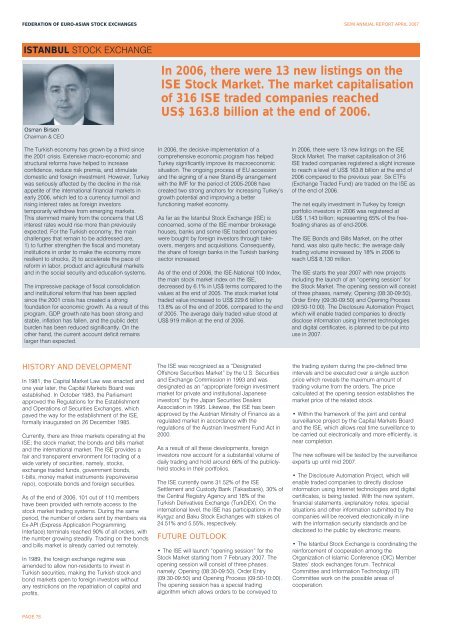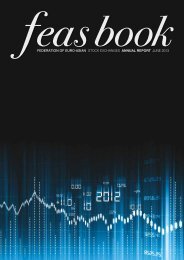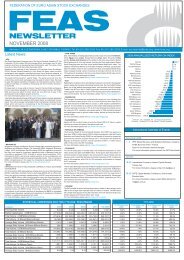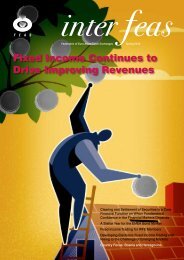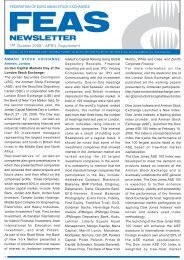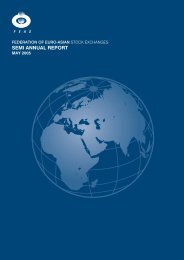Download - FEAS
Download - FEAS
Download - FEAS
You also want an ePaper? Increase the reach of your titles
YUMPU automatically turns print PDFs into web optimized ePapers that Google loves.
FEDERATION OF EURO-ASIAN STOCK EXCHANGES SEMI ANNUAL REPORT APRIL 2007<br />
ISTANBUL STOCK EXCHANGE<br />
Osman Birsen<br />
Chairman & CEO<br />
In 2006, there were 13 new listings on the<br />
ISE Stock Market. The market capitalisation<br />
of 316 ISE traded companies reached<br />
US$ 163.8 billion at the end of 2006.<br />
The Turkish economy has grown by a third since<br />
the 2001 crisis. Extensive macro-economic and<br />
structural reforms have helped to increase<br />
confidence, reduce risk premia, and stimulate<br />
domestic and foreign investment. However, Turkey<br />
was seriously affected by the decline in the risk<br />
appetite of the international financial markets in<br />
early 2006, which led to a currency turmoil and<br />
rising interest rates as foreign investors<br />
temporarily withdrew from emerging markets.<br />
This stemmed mainly from the concerns that US<br />
interest rates would rise more than previously<br />
expected. For the Turkish economy, the main<br />
challenges that remain to be addressed are,<br />
1) to further strengthen the fiscal and monetary<br />
institutions in order to make the economy more<br />
resilient to shocks, 2) to accelerate the pace of<br />
reform in labor, product and agricultural markets<br />
and in the social security and education systems.<br />
The impressive package of fiscal consolidation<br />
and institutional reform that has been applied<br />
since the 2001 crisis has created a strong<br />
foundation for economic growth. As a result of this<br />
program, GDP growth rate has been strong and<br />
stable, inflation has fallen, and the public debt<br />
burden has been reduced significantly. On the<br />
other hand, the current account deficit remains<br />
larger than expected.<br />
In 2006, the decisive implementation of a<br />
comprehensive economic program has helped<br />
Turkey significantly improve its macroeconomic<br />
situation. The ongoing process of EU accession<br />
and the signing of a new Stand-By arrangement<br />
with the IMF for the period of 2005-2008 have<br />
created two strong anchors for increasing Turkey’s<br />
growth potential and improving a better<br />
functioning market economy.<br />
As far as the Istanbul Stock Exchange (ISE) is<br />
concerned, some of the ISE member brokerage<br />
houses, banks and some ISE traded companies<br />
were bought by foreign investors through takeovers,<br />
mergers and acquisitions. Consequently,<br />
the share of foreign banks in the Turkish banking<br />
sector increased.<br />
As of the end of 2006, the ISE-National 100 Index,<br />
the main stock market index on the ISE,<br />
decreased by 6.1% in US$ terms compared to the<br />
values at the end of 2005. The stock market total<br />
traded value increased to US$ 229.6 billion by<br />
13.8% as of the end of 2006, compared to the end<br />
of 2005. The average daily traded value stood at<br />
US$ 919 million at the end of 2006.<br />
In 2006, there were 13 new listings on the ISE<br />
Stock Market. The market capitalisation of 316<br />
ISE traded companies registered a slight increase<br />
to reach a level of US$ 163.8 billion at the end of<br />
2006 compared to the previous year. Six ETFs<br />
(Exchange Traded Fund) are traded on the ISE as<br />
of the end of 2006.<br />
The net equity investment in Turkey by foreign<br />
portfolio investors in 2006 was registered at<br />
US$ 1,143 billion; representing 65% of the freefloating<br />
shares as of end-2006.<br />
The ISE Bonds and Bills Market, on the other<br />
hand, was also quite hectic; the average daily<br />
trading volume increased by 18% in 2006 to<br />
reach US$ 8,130 million.<br />
The ISE starts the year 2007 with new projects<br />
including the launch of an “opening session” for<br />
the Stock Market. The opening session will consist<br />
of three phases, namely; Opening (08:30-09:50),<br />
Order Entry (09:30-09:50) and Opening Process<br />
(09:50-10:00). The Disclosure Automation Project,<br />
which will enable traded companies to directly<br />
disclose information using Internet technologies<br />
and digital certificates, is planned to be put into<br />
use in 2007.<br />
HISTORY AND DEVELOPMENT<br />
In 1981, the Capital Market Law was enacted and<br />
one year later, the Capital Markets Board was<br />
established. In October 1983, the Parliament<br />
approved the Regulations for the Establishment<br />
and Operations of Securities Exchanges, which<br />
paved the way for the establishment of the ISE,<br />
formally inaugurated on 26 December 1985.<br />
Currently, there are three markets operating at the<br />
ISE; the stock market, the bonds and bills market<br />
and the international market. The ISE provides a<br />
fair and transparent environment for trading of a<br />
wide variety of securities, namely, stocks,<br />
exchange traded funds, government bonds,<br />
t-bills, money market instruments (repo/reverse<br />
repo), corporate bonds and foreign securities.<br />
As of the end of 2006, 101 out of 110 members<br />
have been provided with remote access to the<br />
stock market trading systems. During the same<br />
period, the number of orders sent by members via<br />
Ex-API (Express Application Programming<br />
Interface) terminals reached 90% of all orders, with<br />
the number growing steadily. Trading on the bonds<br />
and bills market is already carried out remotely.<br />
In 1989, the foreign exchange regime was<br />
amended to allow non-residents to invest in<br />
Turkish securities, making the Turkish stock and<br />
bond markets open to foreign investors without<br />
any restrictions on the repatriation of capital and<br />
profits.<br />
The ISE was recognized as a “Designated<br />
Offshore Securities Market” by the U.S. Securities<br />
and Exchange Commission in 1993 and was<br />
designated as an “appropriate foreign investment<br />
market for private and institutional Japanese<br />
investors” by the Japan Securities Dealers<br />
Association in 1995. Likewise, the ISE has been<br />
approved by the Austrian Ministry of Finance as a<br />
regulated market in accordance with the<br />
regulations of the Austrian Investment Fund Act in<br />
2000.<br />
As a result of all these developments, foreign<br />
investors now account for a substantial volume of<br />
daily trading and hold around 66% of the publiclyheld<br />
stocks in their portfolios.<br />
The ISE currently owns 31.52% of the ISE<br />
Settlement and Custody Bank (Takasbank), 30% of<br />
the Central Registry Agency and 18% of the<br />
Turkish Derivatives Exchange (TurkDEX). On the<br />
international level, the ISE has participations in the<br />
Kyrgyz and Baku Stock Exchanges with stakes of<br />
24.51% and 5.55%, respectively.<br />
FUTURE OUTLOOK<br />
• The ISE will launch “opening session” for the<br />
Stock Market starting from 7 February 2007. The<br />
opening session will consist of three phases,<br />
namely; Opening (08:30-09:50), Order Entry<br />
(09:30-09:50) and Opening Process (09:50-10:00).<br />
The opening session has a special trading<br />
algorithm which allows orders to be conveyed to<br />
the trading system during the pre-defined time<br />
intervals and be executed over a single auction<br />
price which reveals the maximum amount of<br />
trading volume from the orders. The price<br />
calculated at the opening session establishes the<br />
market price of the related stock.<br />
• Within the framework of the joint and central<br />
surveillance project by the Capital Markets Board<br />
and the ISE, which allows real time surveillance to<br />
be carried out electronically and more efficiently, is<br />
near completion.<br />
The new software will be tested by the surveillance<br />
experts up until mid 2007.<br />
• The Disclosure Automation Project, which will<br />
enable traded companies to directly disclose<br />
information using Internet technologies and digital<br />
certificates, is being tested. With the new system,<br />
financial statements, explanatory notes, special<br />
situations and other information submitted by the<br />
companies will be received electronically in line<br />
with the information security standards and be<br />
disclosed to the public by electronic means.<br />
• The Istanbul Stock Exchange is coordinating the<br />
reinforcement of cooperation among the<br />
Organization of Islamic Conference (OIC) Member<br />
States’ stock exchanges forum. Technical<br />
Committee and Information Technology (IT)<br />
Committee work on the possible areas of<br />
cooperation.<br />
PAGE 78


